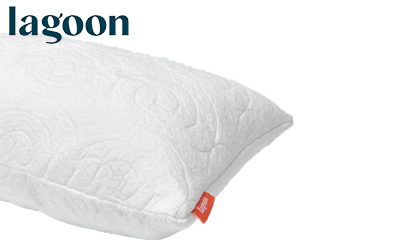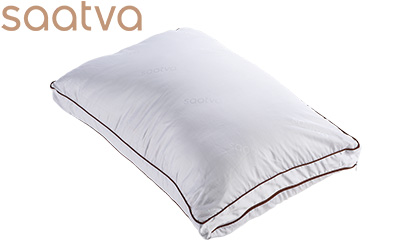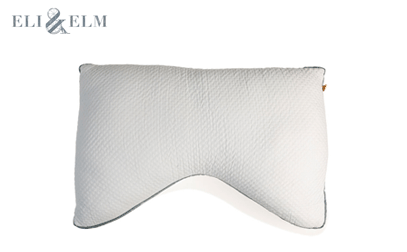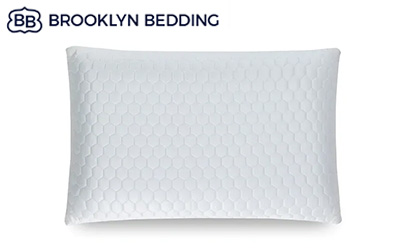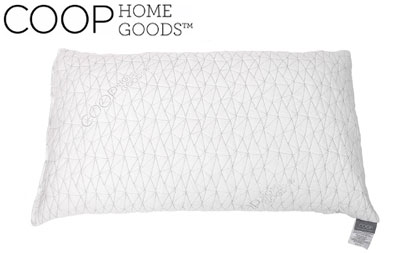Is back pain preventing you from getting the sleep you need? Could changing your pillow help?
Frequent back pain is a problem that can rob people of the high-quality sleep they need. This type of discomfort can be temporary without a known cause or could be ongoing and a result of various medical conditions.
Believe it or not, your sleeping position, the type of mattress you have, and even your pillow may all be contributing to the problem. In this guide, you will learn some of the top strategies for alleviating back pain and find our choices for the top-rated pillows for back pain.
Best Back Pain Pillows
- Lagoon The Fox Pillow – Editor’s Choice
- Saatva Latex Pillow – Best Latex Back Pain Pillow
- Eli and Elm Cotton Side Sleeper Pillow – Best Back Pain Pillow for Side Sleepers
- Brooklyn Bedding Cooling Memory Foam – Best Cooling Back Pain Pillow
- Coop Sleep Goods Eden Pillow – Best Back Pain Pillow for Stomach Sleepers
Sleep Advisor’s Testing Methodology
At Sleep Advisor, our product reviews are based on findings from in-person tests that allow us to have a genuine understanding of how the mattress feels and performs.
For this roundup, we prioritized features that are especially important for pillows for back pain. We paid special attention to components such as pillow thickness, support elements, material, and cooling features.
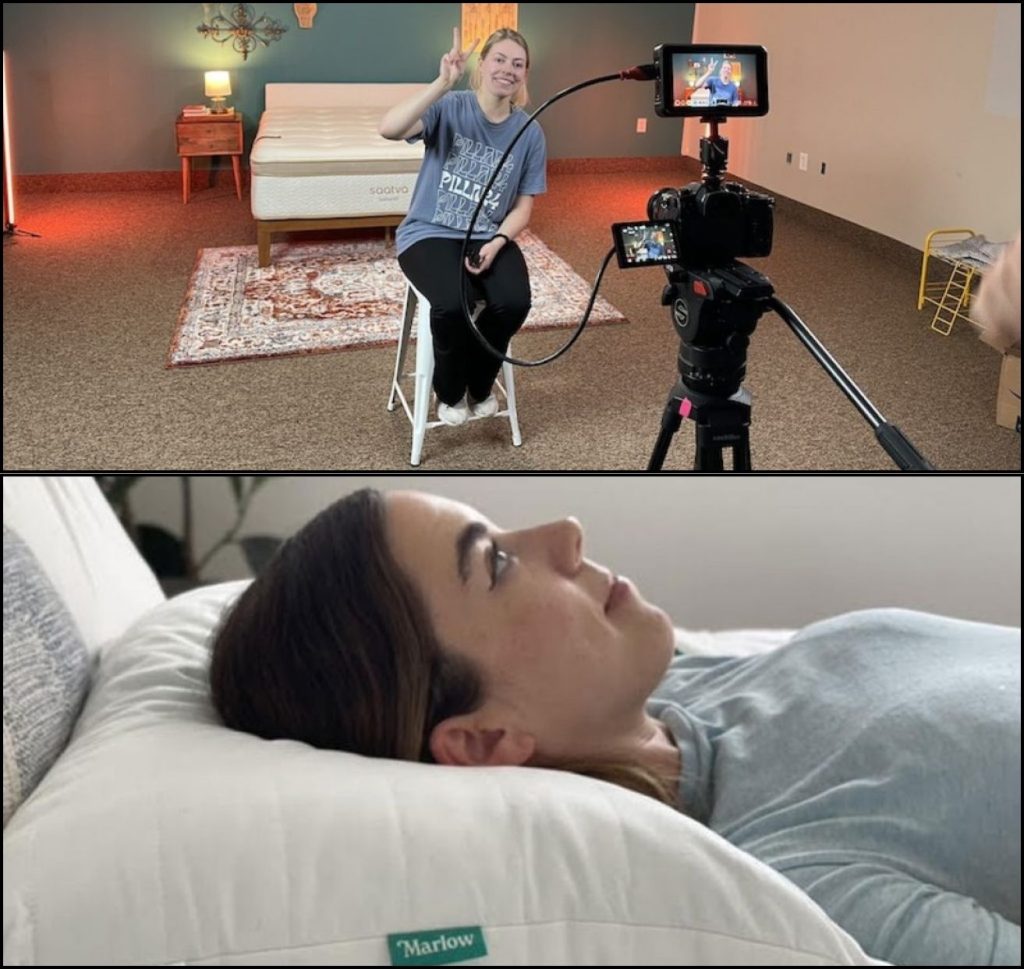
5 Top Rated Back Pain Pillows Reviewed
Editor’s Choice
Back sleepers usually need a balance of support and pressure relief to ensure proper spine alignment and comfort. Healthy spine alignment eases pain and tension by taking pressure off of the lower back. The Lagoon Fox pillow’s adjustable height allows back sleepers to customize the feel based on the amount of support and pressure relief they need. Able to accommodate all body types, the Fox pillow’s fill can be added or removed based on how much support you prefer.
The Fox features CertiPUR-US® certified memory foam which helps provide the support back sleepers need. This foam fill also contours to your head and neck to prevent pressure build-up. For those who sleep hot, the memory foam is shredded for greater airflow while the bamboo and polyester promotes plenty of breathability. It’s also hypoallergenic for those struggling with allergies.
What stands out?
- The Lagoon Fox pillow is machine washable, which means it’s easy to keep clean. Make sure to use cold water and gentle cycles to avoid any damage. Tumble-drying is also safe as long as you choose low heat.
Best Latex Pillow for Back Pain
Saatva Latex Pillow
A pressure-relieving pillow made with natural latex.
Saatva Score
4.80 / 5
Read Full ReviewLatex is a great material for pain relief because it’s naturally pressure-relieving, but still supportive. If you’re looking for a hotel-quality latex pillow, you may want to check out this option from Saatva. Its natural latex core earned a recommendation from orthopedists and chiropractors, making the Saatva Latex pillow an excellent choice for people with back pain. The latex also promotes plenty of bounce and responsiveness, so you should notice excellent support without feeling trapped inside the pillow.
Besides offering plenty of support, this pillow’s organic cotton sateen cover helps the surface stay breathable and moisture-wicking. To help the pillow keep its shape, Saatva wove gusseted sides into the pillow. Beneath this cover lies a plush fill made from down-like microdenier fiber. This material is also hypoallergenic and breathable to prevent overheating and bacteria build-up.
Why we chose it:
- Latex is buoyant material that provides pressure relief without taking away from the support that helps keep your neck aligned with the rest of your body.
Best Back Pain Pillow for Side Sleepers
Eli & Elm Side-Sleeper Pillow
A contoured designed pillow for side and back sleepers.
Eli & Elm Score
4.30 / 5
Side sleepers with back pain should benefit from this Eli and Elm Side Sleeper Pillow as it’s designed specifically for this sleeping position. The pillow has a unique U-Shape design that conforms to your neck and head, which should help promote spine alignment and alleviate neck pain.
The pillow features a removable latex and polyester filling so you can customize its height and firmness. There’s a zip that allows easy access, so the whole process shouldn’t take longer than a minute. For extra breathability, the cover is made from a cotton, polyester, and spandex blend. In addition, both the cover and the interior liner are machine washable.
What makes it stand out?
- The unique U-shape design is comfortable for side sleepers but can also work for other sleeping positions if you add or remove the fill. Additionally, you can get custom pillowcases from Eli and Elm.
Best Cooling Pillow for Back Pain
Brooklyn Bedding Luxury Cooling Pillow
A pillow with dual-action cooling for hot sleepers.
Brooklyn Bedding Score
4.60 / 5
While the mattress you sleep on is important for cooler rest, so is your pillow. This Brooklyn Bedding pillow is made with dual-action cooling to provide a cooler sleep surface for those who sleep hot. The pillow uses a circular cover to promote airflow along with a gel infusion which helps draw the heat away from your head and neck. In addition, the copper-graphite infusion also has antimicrobial benefits to suit those who are sensitive to allergies.
You also have the choice between a low profile and a high profile which allows you to customize the pillow based on your sleep position and support needs. Back and stomach sleepers should consider the low option as it allows better spine alignment in this position.
What makes it unique:
- In addition to its cooling abilities, this Brooklyn Bedding pillow responds to pressure to allow continuous support along your head and neck. As a result, it should help alleviate back pain by keeping your neck aligned.
Best Back Pain Pillow for Stomach Sleepers
Coop Eden Pillow
A gel-infused memory foam pillow with a hypoallergenic design
Coop Score
4.60 / 5
Stomach sleepers with back pain need a pillow with a lower loft that can properly support the head. If the head sinks too much, it can cause your neck to fall out of alignment with your spine, exacerbating any existing back pain. The Coop Sleep Goods Eden pillow is adjustable, so you can remove as much fill as you need to make it suit your preferred sleeping position.
This pillow is designed to provide a balance of support and pressure relief, which makes it a good option for people with neck and back pain. The case is made with Lulltra fabric, which is a viscose rayon and polyester blend that promotes plenty of breathability so that no heat can build up around your head. It’s also easy to add or remove the fill thanks to the zippable cover.
Why we like it
- Although stomach sleepers usually look for a lower loft, the Coop Sleep Goods Eden pillow comes with an extra 0.5-pound bag of fill should you ever want to switch up your sleeping position.
Why to Consider Pillow Support When Sleeping in Bed
Ideally, lower-end pillows should be changed every 6 months and high-quality memory foam or specialty pillows should be replaced after 1-2 years. The reality is that many people hold on to the familiarity of these items for much longer, sleeping on surfaces that are flat and lumpy.
Discomfort that is worse in the morning but gradually dissipates and even disappears throughout the day may be a sign that the spine is being inadequately supported during the night. Sleeping in any position that places the spine in an unnatural position will eventually lead to aches and pains.
Pillow Shape
Depending on the type and location of back pain, the pillow shape could make a difference. While there are many pillow shapes, they can be generalized into two major categories:
- Curved:
Also known as cervical or orthopedic pillows, these cushions have a contoured surface that is designed to support the head and neck. Most are made from memory foam. - Even:
These traditional pillows feature a flat, even surface but vary widely in the type of material they contain, loft, and size. While a standard polyester fill may be inadequate for supporting individuals with back pain, materials that offer more conformity for relieving pressure on the neck and spine are ideal.
Loft
Pillow loft is a term for the thickness or height of a pillow before any weight is placed on it. While individual manufacturers often have their own definition of loft, most fall into the following categories:
- Low: < 3 inches thick
- Medium: 3-5 inches thick
- High: > 5 inches thick
Sleeping Position
Your sleeping position is a big factor in determining the best pillow choice. The ideal loft depends on whether you sleep on your back, stomach, or side, or find yourself changing positions frequently throughout the night.
Sleeping on the back can promote a straight spine, so a low or medium loft pillow should help keep the head in a neutral position with the spine. Side sleeping often creates space between the head and mattress, requiring a medium to high loft to fill this gap. Stomach sleepers often prefer a lower loft or no pillow at all since even mild elevation of the head may cause strain on the neck and spine.
Read More:
Pillow Strategies for Sleeping Positions
If a pillow is too high or too low, the head will not be in alignment with the spine. Individuals with certain medical conditions may also benefit from additional support between the knees, under the legs, or to elevate a single limb.
Side Sleepers
- Knees Tucked to Chest (Fetal Position):
The fetal position can be helpful for those suffering from lower back or disc pain. Tucking the knees into the chest while lying on one side should help to open up the spine and alleviate unnecessary pressure. In this position, a medium-high loft pillow would be ideal.
- Pillow Between Knees:
Placing a pillow between the knees may help to promote proper alignment of the hips and pelvis with the spine. Ideally, the area between the shoulders and the hips should make contact with the mattress; otherwise, a small pillow can be placed in this area too.
Find Out More: How To Properly Sleep On Your Side
Stomach Sleepers
- Pillow Under Pelvis: Placing a pillow under the pelvis and lower abdomen should help to reduce strain on the spine and prevent the back from sinking into the mattress. Sleeping without a pillow under the head is ideal for stomach sleepers, but if necessary, a small pillow can be used.
Back Sleepers
- Pillow Under Knees: Back sleepers should consider placing a pillow under the knees. By doing so, the pillow supports the natural lower back curve, helping the spine to remain neutral. The pillow doesn’t have to be high, but you can try several loft options to figure out which is the most comfortable. You may also want to add a low pillow under your lower back for some added support in this position.
Fill Materials
There are many options when it comes to fill materials, each with pros and cons. Keep in mind things like allergies, temperature regulation, and whether you prefer sinkage or greater support. Some models also allow you to adjust the loft by adding or removing some of the fill materials.
- Memory Foam:
Memory foam may be solid or shredded and is designed to soften upon contact with body heat, contouring to the shape of the head and neck. While this material is popular in orthopedic designs and may offer exceptional pressure relief, traditional and non-treated materials tend to absorb heat and sleep “hot”, which may not be ideal for many sleepers.
Check Out Our Guide: Best Memory Foam Pillow
- Latex:
Latex is a material extracted from the sap of rubber trees. This material usually maintains its shape for a long lifespan and provides even support. Unfortunately, latex tends to be dense and heavy and could be an allergen for some individuals.
- Polyester:
Polyester may refer to interlocking fibers or shredded polyfoam, similar to memory foam but at a lower cost. This material offers an affordable option that could provide support and relief from back pain, but these pillows often flatten easily and may sleep hot.
- Buckwheat:
Buckwheat is a grain-like seed that is a natural and hypoallergenic material. They may offer an adjustable loft and good temperature regulation but are often quite heavy and firm. Buckwheat does offer good support, but most individuals with back pain prefer something softer.
- Feathers:
Pillows containing the outer feathers from geese or ducks are usually firmer than “down” pillows, offering greater support for those suffering from back pain. Many have an adjustable loft and a long lifespan. Unfortunately, most feather pillows are very expensive and tend to flatten easily.
- Down:
Down fill refers to the soft, inner feathers from ducks or geese, possibly with outer plumage for extra padding. These soft pillows may feature an adjustable loft and are known to sleep cool. Down feathers often flatten quickly and are not as supportive for individuals with back issues.
View Our Guide: Top Rated Down Pillows
- Down Alternatives:
Down alternatives are designed to mimic the softness of real feathers but are actually made from polyester fibers. Down alternatives can be a good option for those with an allergy to feathers and are often more affordable. These pillows are very soft and tend to flatten over time, making them less suitable for back support.
- Water:
Water pillows feature chambers that can be filled with water to adjust the loft. These designs usually have foam padding to increase comfort and are known for offering exceptional relief from pain and pressure. These pillows tend to retain their shape and adjust to the alignment of the body.
Head Size, Shoulder Width, and Weight Factors
The size and shape of your body are important considerations when it comes to choosing the right pillow. People with small to average sized heads may prefer medium height pillows to feel the most comfortable. Individuals with larger noggins may find that they sink too deeply into average pillows and often prefer higher lofts that can adequately support their heads.
Similar to head size, people with narrow shoulders often prefer lower or medium height pillows that keep the head and neck in a neutral position with the spine. Having broader shoulders may create unnecessary gaps between the head and the pillow, but a higher loft could help to support the head and provide the extra space they need.
Body weight is also a factor when it comes to shopping for the right pillow. Lighter individuals are less prone to sink into the mattress and tend to prefer medium-loft pillows that will help to promote optimal spinal alignment. Those with heavier weight considerations are more likely to experience sinkage and may find a lower-loft pillow helps to keep the head even with the spine.
Why is Pillow Support Important for Sleeping?
Pillow support is important for sleeping because it fosters good spine alignment, which is essential for preventing back irritation, shoulder soreness, and neck pain. Discomfort that is worse in the morning but gradually dissipates and even disappears throughout the day may be a sign that the spine is inadequately supported during the night. Sleeping in any position that places the spine in an unnatural position will eventually lead to aches and pains.
Ideally, lower-end pillows should be changed every 6 months and high-quality memory foam or specialty pillows should be replaced after 1-2 years. The reality is that many people hold on to the familiarity of these items for much longer, sleeping on surfaces that are flat and lumpy.
Additional Considerations for Relief
Potential Coping Strategies
Finding relief from back pain may take time while your body tries to heal. You may be tempted to curl up on the couch and wait this process out, but most experts recommend a dynamic healing approach. These strategies may help to manage pain and promote healing so you can get back to your normal self:
- Keep moving:
Too much rest and inactivity may weaken the muscles, slowing the healing process and making pain worse. While this isn’t the best time to train for a marathon or take up a new sport, gentle activities like walking, yoga, and light stretching could be helpful.
- Consider sleep position:
As we’ve talked about, certain positions may contribute to pain or make it worse. Try changing your sleep position or using pillows to optimally support the spine.
- Use heat and ice:
Heat is known to help loosen tight muscles and ice is used for decreasing inflammation and pain. Try applying something cool like an ice pack or a frozen bag of vegetables for 15 minutes every hour for immediate relief. A warm compress or hot bath may also be helpful, and some people find alternating heat and ice is the most effective.
- Lose the chair:
Sitting at an office desk for hours at a time can lead to slouching and place increased pressure on the spine. Try a standing desk or sitting on a balance ball that forces you to use your core muscles, improving posture.
- Get a massage:
A study1 of 400 individuals found that weekly massages over a 10-week period increased functioning and reduced chronic back pain. If you can’t afford to see a massage therapist, ask your partner to gently massage your most painful areas.
- Reduce stress:
Individuals who have higher levels of stress also tend to report higher levels of pain. Stress can also increase the inflammatory response and prevent healing. Therefore, seeking out ways to reduce your stress levels could create positive results.
Making Sure You Have the Right Mattress
If you have back pain, having the right amount of support is important. The firmness of your mattress can make the difference between a comfortable night’s rest and feeling bent out of shape the next morning.
Your ideal mattress will depend on your sleeping position, body weight, and the construction/materials. There are many supportive mattress brands available to suit your needs. If you are unsure about where to begin, consult one of our mattress guides to help you choose the right mattress for you.
Pain-Reducing Mattress Toppers
Many people choose a mattress based on what they think they will like or what feels comfortable when they test it out at the store. Testing out a mattress for a few minutes while shopping can be very different than sleeping on this surface for multiple hours every day. For this reason, many companies offer trial periods and free exchange.
If buying a new mattress is not an option, mattress toppers can be a great way to change the support and feel of your bed. Toppers offer an individual layer of cushioning that sits on top of your existing mattress, making it possible to adjust the level of firmness.
Read more: Best Mattress Toppers for Back Pain
Frequently Asked Questions
Can pillows make your back hurt?
A pillow could make your back hurt if it doesn’t fit your preferred sleeping position. In other words, stomach sleepers may wake up with back pain if their pillow is too high. Although they’d primarily feel discomfort in the neck area, the pain can go down to their back, especially after a while. Additionally, side sleepers may feel the same way if their pillow is too thin.
Which pillow is best for back pain?
The best pillow for back pain is the one that fits your needs in terms of support, height, and preferred sleeping position. You want a pillow that supports your neck and helps with proper posture so that your spine is always in alignment. This way, you’re less likely to wake up with back pain.
What type of pillow is best for side sleepers with back pain?
Side sleepers need a pillow that supports the head and prevents it from collapsing down to the mattress. This is usually a medium to high loft pillow that is also medium-firm or firm. When it comes to materials, side sleepers with back pain may want to focus on memory foam.
Is a soft or hard pillow better for your back?
Harder pillows are better when it comes to supporting your head and spine for proper posture. This usually applies to all sleep positions, although some stomach sleepers may get away with a softer and thinner pillow than back and side sleepers.
How can I sleep to prevent back pain?
Research2 suggests that sleep and pain are related, so preventing back pain may improve your sleep quality. You can prevent back pain by placing pillows under your knees or in between them. If you’re a stomach sleeper, try adding a pillow under your pelvis. On the other hand, you can also try tucking your knees to the chest if you prefer sleeping on your side. Having the right type of mattress is also crucial, so make sure yours is supportive enough.
What’s the worst pillow to use if you have back pain?
Soft pillows are typically not recommended for those with back pain because they don’t provide enough support. Most sleepers, especially those sleeping on their side and back, need a medium to firm pillow to keep the head and neck aligned with the rest of the spine. A pillow with a too-low loft may also be a bad choice for back and side sleepers.

Melanie Kassel
Performance Editor
About Author
As Sleep Advisor’s Performance Editor, Melanie writes and edits content throughout the site to ensure it’s accurate, engaging, and up-to-date.
Combination Sleeper

